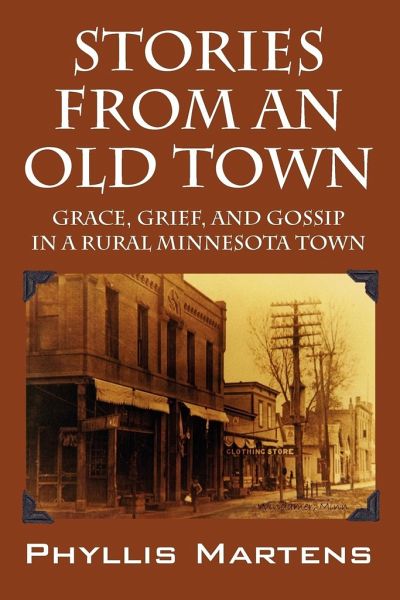
Stories from an Old Town
Grace, Grief, and Gossip in a Rural Minnesota Town
Versandkostenfrei!
Versandfertig in 1-2 Wochen
16,99 €
inkl. MwSt.

PAYBACK Punkte
8 °P sammeln!
This sturdy 1930s town, surrounded by the cornfields of southern Minnesota, is home to German-speaking immigrants, hard-working farmers who make sure their town functions properly: it has a hospital, post office, schools, stores, churches, grain elevators. A town to be proud of. But during the course of small-town daily life, startling events take place. A young girl engaged to a missionary is tricked into a disastrous marriage with another man. The Jungas hardware store burns to the ground. Church burial is denied to a suicide. Then there is the struggle between the rigidly conservative and m...
This sturdy 1930s town, surrounded by the cornfields of southern Minnesota, is home to German-speaking immigrants, hard-working farmers who make sure their town functions properly: it has a hospital, post office, schools, stores, churches, grain elevators. A town to be proud of. But during the course of small-town daily life, startling events take place. A young girl engaged to a missionary is tricked into a disastrous marriage with another man. The Jungas hardware store burns to the ground. Church burial is denied to a suicide. Then there is the struggle between the rigidly conservative and more liberal church groups, each sure of its ground and intolerant of the other. Caught in the middle are those struggling to understand. Tante Lieze, a central character, ponders God's perplexing intentions, beginning with her own troublesome situation. Her faith that something good will come of it all is shaken by what she learns about the birth of her deformed child. Forgiveness, she finds, is not easy. What 'grace' means is left to another woman, Grace Krahn, to define. Still, the town holds together. People know each other, wander in and out of each other's stories. They rally to the support of folks in trouble, the lowly converse (probably in Low German) with the respected, all gather in the park for town events. Windamer survives, has survived to this day. Excerpt: Hard times had come upon Tante Lieze Gunter. "As if your other troubles weren't enough," the women told her in Stoesz's General Store, standing between the counters in their square heavy coats and woolen head shawls. The pleasant odor of coffee, pinewood flooring, and new cloth hung in the air. Tante Lieze closed her purse and picked up her shopping bag, ready to go home. "Et jeyt," she said in Low German. "It goes." "But, in the basement! It's too damp. It isn't good. And what about Lentye?" The women shook their heads and clucked their tongues. "You can't leave her alone, surely?" "Na nae, Frieda is with her." Tante Lieze left the store and walked down the road, slowly because her knees pained her. Well, the women were right. It wasn't good, she knew that herself.












